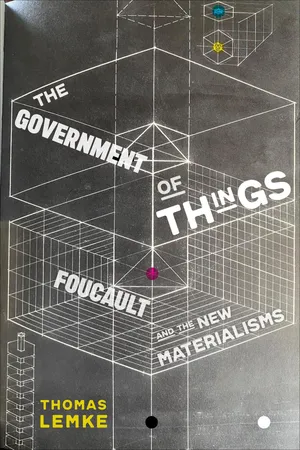
- 309 pages
- English
- ePUB (mobile friendly)
- Available on iOS & Android
About this book
Examines the theoretical achievements and the political impact of the new materialisms
Materialism, a rich philosophical tradition that goes back to antiquity, is currently undergoing a renaissance. In
The Government of Things, Thomas Lemke provides a comprehensive overview and critical assessment of this "new materialism". In analyzing the work of Graham Harman, Jane Bennett, and Karen Barad, Lemke articulates what, exactly, new materialism is and how it has evolved. These insights open up new spaces for critical thought and political experimentation, overcoming the limits of anthropocentrism.
Drawing on Michel Foucault's concept of a "government of things", the book also goes beyond new materialist scholarship which tends to displace political questions by ethical and aesthetic concerns. It puts forward a relational and performative account of materialities that more closely attends to the interplay of epistemological, ontological, and political issues.
Lemke provides definitive and much-needed clarity about the fascinating potential—and limitations—of new materialism as a whole.
The Government of Things revisits Foucault's more-than-human understanding of government to capture a new constellation of power: "environmentality". As the book demonstrates, contemporary modes of government seek to control the social, ecological, and technological conditions of life rather than directly targeting individuals and populations. The book offers an essential and much needed tool to critically examine this political shift.
Frequently asked questions
- Essential is ideal for learners and professionals who enjoy exploring a wide range of subjects. Access the Essential Library with 800,000+ trusted titles and best-sellers across business, personal growth, and the humanities. Includes unlimited reading time and Standard Read Aloud voice.
- Complete: Perfect for advanced learners and researchers needing full, unrestricted access. Unlock 1.4M+ books across hundreds of subjects, including academic and specialized titles. The Complete Plan also includes advanced features like Premium Read Aloud and Research Assistant.
Please note we cannot support devices running on iOS 13 and Android 7 or earlier. Learn more about using the app.
Information
Table of contents
- Cover
- Title Page
- Copyright Page
- Contents
- Introduction
- Part I: Varieties of Materialism
- Part II: Elements of a More-Than-Human Analytics of Government
- Part III: Toward a Relational Materialism
- Acknowledgments
- Notes
- Bibliography
- Index
- About the Author